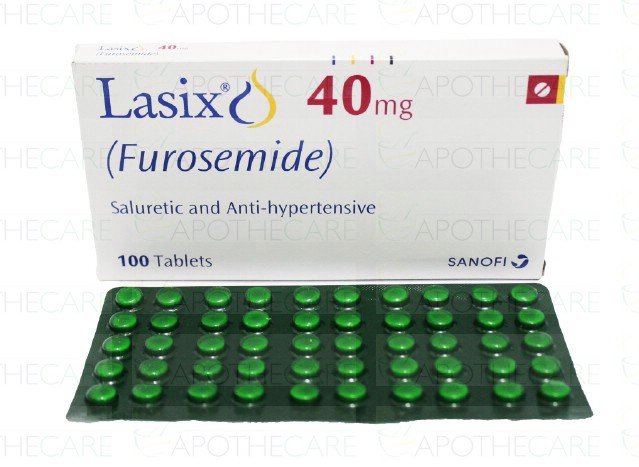- High blood pressure (hypertension) – Too much fluid in the body can make blood pressure rise. Lasix helps lower it.
- Swelling (edema) – It reduces swelling caused by heart disease, liver disease, or kidney problems.
- Heart failure – This medicine helps the heart by removing extra fluid that makes it work harder.
- Always follow your doctor’s instructions.
- It is usually taken once or twice a day, with or without food.
- Take it in the morning or early afternoon to avoid waking up at night to urinate.
- Drink plenty of water unless your doctor tells you otherwise.
- Frequent urination (this is normal and shows the medicine is working).
- Dizziness or feeling lightheaded.
- Dry mouth or thirst.
- Low potassium levels, which can cause muscle weakness or cramps.
- Ringing in the ears (rare but serious).
- Dehydration – Since it removes water from the body, drink enough fluids to stay hydrated.
- Electrolyte imbalance – Your doctor may check your potassium and sodium levels regularly.
- Kidney or liver problems – If you have these conditions, use Lasix carefully.
- Pregnancy and breastfeeding – Only take it if your doctor says it is safe.
- High blood pressure (hypertension) – Too much fluid in the body can make blood pressure rise. Lasix helps lower it.
- Swelling (edema) – It reduces swelling caused by heart disease, liver disease, or kidney problems.
- Heart failure – This medicine helps the heart by removing extra fluid that makes it work harder.
- Always follow your doctor’s instructions.
- It is usually taken once or twice a day, with or without food.
- Take it in the morning or early afternoon to avoid waking up at night to urinate.
- Drink plenty of water unless your doctor tells you otherwise.
- Frequent urination (this is normal and shows the medicine is working).
- Dizziness or feeling lightheaded.
- Dry mouth or thirst.
- Low potassium levels, which can cause muscle weakness or cramps.
- Ringing in the ears (rare but serious).
- Dehydration – Since it removes water from the body, drink enough fluids to stay hydrated.
- Electrolyte imbalance – Your doctor may check your potassium and sodium levels regularly.
- Kidney or liver problems – If you have these conditions, use Lasix carefully.
- Pregnancy and breastfeeding – Only take it if your doctor says it is safe.
What is Lasix 40mg?
Lasix 40mg is a medicine that helps the body get rid of extra water and salt by making you urinate more. It contains the active ingredient furosemide, which is a type of drug called a diuretic or water pill.
What is Lasix 40mg Used For?
Doctors prescribe Lasix 40mg to treat conditions where the body holds too much fluid, such as:
How to Take Lasix 40mg
Possible Side Effects
Like all medicines, Lasix 40mg may cause some side effects, including:
If you experience severe side effects like fainting, confusion, or trouble breathing, seek medical help immediately.
Precautions and Warnings
Conclusion
Lasix 40mg is a helpful medicine for people who have high blood pressure, swelling, or heart problems. It works by removing extra fluid from the body. However, it should only be used under a doctor’s guidance, as it can cause dehydration and other side effects. Always follow your doctor’s advice and stay hydrated while using Lasix.
What is Lasix 40mg?
Lasix 40mg is a medicine that helps the body get rid of extra water and salt by making you urinate more. It contains the active ingredient furosemide, which is a type of drug called a diuretic or water pill.
What is Lasix 40mg Used For?
Doctors prescribe Lasix 40mg to treat conditions where the body holds too much fluid, such as:
How to Take Lasix 40mg
Possible Side Effects
Like all medicines, Lasix 40mg may cause some side effects, including:
If you experience severe side effects like fainting, confusion, or trouble breathing, seek medical help immediately.
Precautions and Warnings
Conclusion
Lasix 40mg is a helpful medicine for people who have high blood pressure, swelling, or heart problems. It works by removing extra fluid from the body. However, it should only be used under a doctor’s guidance, as it can cause dehydration and other side effects. Always follow your doctor’s advice and stay hydrated while using Lasix.
| packing pills | 30 pills, 60 pills, 120 pills, 180 pills, 200 pills, 250 pills, 300 pills, 400 pills, 500 pills |
|---|

 Cart is empty
Cart is empty 









Reviews
There are no reviews yet.